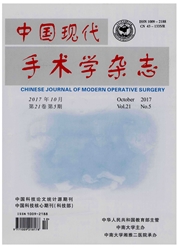

 中文摘要:
中文摘要:
目的比较不同冠状静脉窦逆行灌注(retrograde coronary sinus perfusion,RCSP)压力对双瓣置换术患者的心肌保护作用。方法60例双瓣置换术患者随机分为两组,每组30例,均应用首次主动脉根部顺行灌注(antegrade coronary perfusion,ACP)联合后续RCSP的方式行心肌保护。A组逆灌压力为30mmHg,B组逆灌压力为40mmHg,对两组心肌保护的效果进行比较。结果与A组相比,B组患者术后多巴胺用量、机械通气时间和ICU住院时间均明显减少(P〈0.05),血清肌酸激酶同功酶(CK-MB)、乳酸脱氢酶(LDH)和肌钙蛋白-I(cTn-I)明显减低(P〈0.05)。A组病人术后出现低心排1例,两组其余病人均无其他并发症。结论在合理的逆灌压力范围内,40mmHg的逆灌压力对心肌的保护效应优于30mmHg。
 英文摘要:
英文摘要:
Objective To compare the myocardial protective effects of different perfusion pressures of retrograde coronary sinus cardioplegia. Methods 60 rheumatic heart disease cases performed bival- vular replacement were divided into two groups randomly, with 30 cases for each. Every patient was per- formed the technique of primary antegrade coronary sinus cardioplegia combined with secondary retrograde coronary sinus cardioplegia. The perfusion pressure was 30 mmHg in group A, and 40 mmHg in group B. The different effects were compared between two groups. Results Compare to group A, the patients had fewer dopamine usage, shorter mechanical ventilation time and ICU stagnation time after operation in group B ( P 〈 O. 05 ) , and the level of CK-MB, LDH and cTn-I were obviously lower after operation in group B ( P 〈 O. 05 ). Only one patient appeared the low cardiac output syndrome in group A. Conclusion The retrograde perfusion pressure of 40 mmHg can induce better myocardial protective effect than 30 mmHg in the proper extent.
 同期刊论文项目
同期刊论文项目
 同项目期刊论文
同项目期刊论文
 期刊信息
期刊信息
